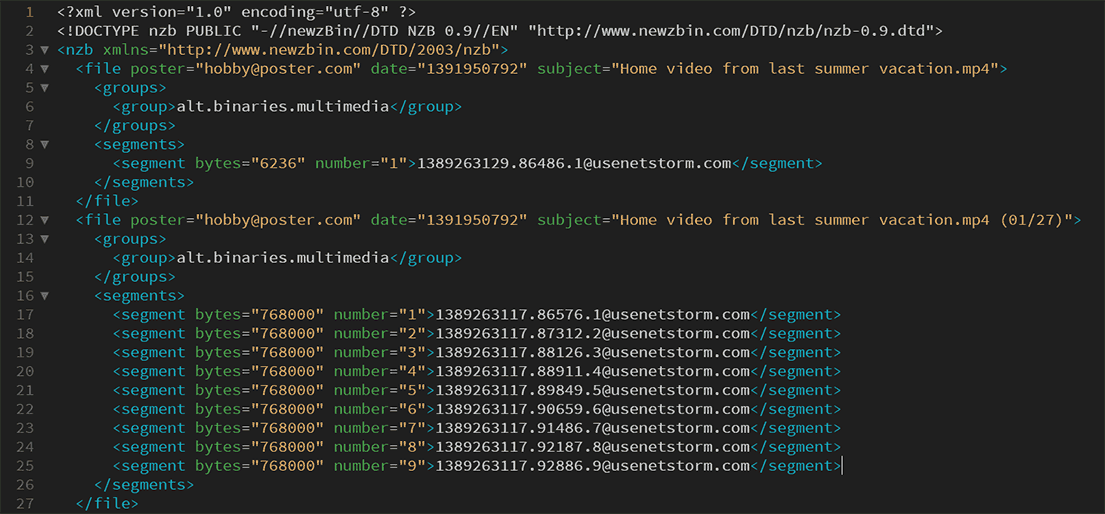What is an NZB File?
An NZB file lists content that Usenet software can download.
NZB files are text files that list posts that are avilable to download from newsgroups. Most commonly, they list all of the parts of a single piece of content that you want to download, but they can also aggregate multiple downloads into a single NZB. It doesn't sound as powerful as it is, but imagine that you have found a 4 Gigabyte video on a news group. If it was uploaded in 1 Megabyte blocks then the file is in 4,000 pieces! If you are browsing a newsgroup, then your Usenet software will just combine all of these and show you 1 listing for the single item that it really is, but what if you wanted to tell someone else about that 4 Gigabyte video? Better yet, what if you wanted to use an indexer service to find things that you like and have your software download them? That indexer needs to be able to give you something to help your software find the 4,000 pieces of that file. That something is an NZB.
So, your friend sent you an NZB file for a great post, or you found something on a website that looks interesting and you got it from them. NZB files are thin little things that looks almost readable if you open one (go ahead, it's ok).
NZB File Format
A long defunct site named Newzbin originally created the NZB file format, which is based on XML. This new file extension caught on quickly as it was a brilliant way to index large downloads in a small text file. Newsreaders quickly added support for the new file extension that Newzbin had created.
Unfortunately, Newzbin chose to focus on a questionable market segment, missing the full potential of the NZB files that they had created. As a result, Newzbin was sued out of existence in 2012.
NZB files, however, offered a legitimate and important new way to look at downloads. It was now possible to back up your entire hard drive to Usenet, move to the other side of the planet, and use a single NZB text file to effortlessly restore your system. Newzbin's initial direction for the file format had been irrelevant.
Example of an NZB File

The NZB file has all of the information for each segment of the download, in an XML based file format. This includes the newsgroup it was posted to, the subject, who uploaded it, the date, unique Message-ID's, and the size of all of the parts.
Using NZB Files
Now you need a program to be able to actually use it to start downloading. The most widely used software currently out there for this is SABnzbd. It has a massive user base and is stable, fast, free, works well with indexers, and it's also open source.
Once you have SABnzbd installed, you can give it this one little NZB file and it will get everything automatically, even taking care of any decompression or file repair if it is needed. This can be done by just double-clicking on the NZB or you can give it the URL so you don't even need to have it on your computer, this just depends on what is easier for you.
That's it, they are pretty simple. They provide an easy way to tell other people about large files. They aren't the files themselves, but a condensed list of them that your program can use to get the actual files. Once you give the NZB to your downloader, the process is totally hands off and as automatic as if you had double-clicked and downloaded manually.
As you can see, they make web-based Usenet indexers possible, and can make your downloads and sharing your finds with friends much easier.
NZB indexers are search engines by another name.

An indexer scans the headers of all of the alt.binaries on Usenet and organizes the data to help you make logical sense of the vast number of files available. This is a big accomplishment as Usenet currently consists of 43 Petabytes of data in 103 Billion posts, across over 100k groups. As you would imagine, the server hardware required for a service like this is not insignificant and often requires multiple large dedicated servers.
Imagine trying to browse web pages and find something interesting without a search engine. That is the difference that an indexer makes for downloading. Instead of having to browse huge newsgroups by hand, they let you search specific ones, all of them at once, or just a range of subjects, file types, and sizes.
Some indexers stop there, and that is a wonderful help for most people, but there are indexers that go beyond indexing headers for searching. These indexers try to make sense of the files. They scan it for being obvious SPAM or a virus, then attempt to categorize the file by subject, sub-categorize by file type, and (if it is multimedia) even determine the quality and length. Some even let you create a list of what you want to download and will notify you if it thinks something is available that matches.
It is a lengthy subject, but don't get overwhelmed. Start with a good but simple "search and download" Usenet indexer. Just don't forget, you will still need something like Newsbin (which we provide for free) to actually download the files you find listed, because the indexer will give you NZB files that still need to be given to Usenet software.
